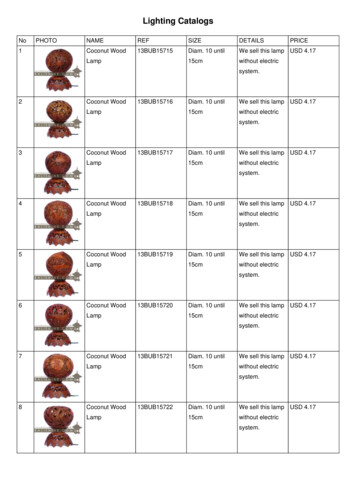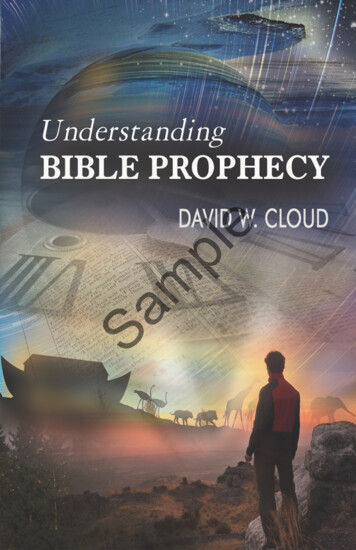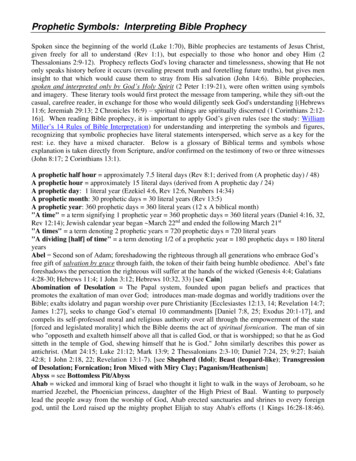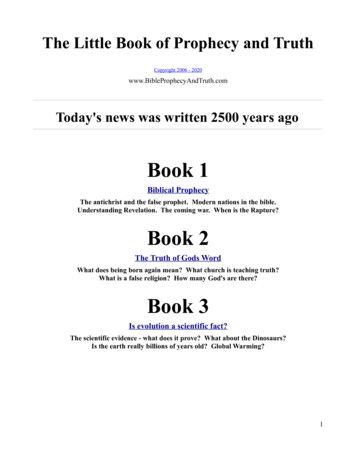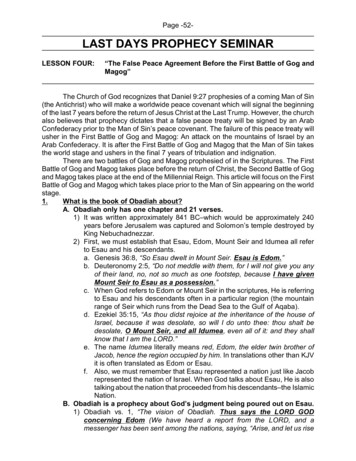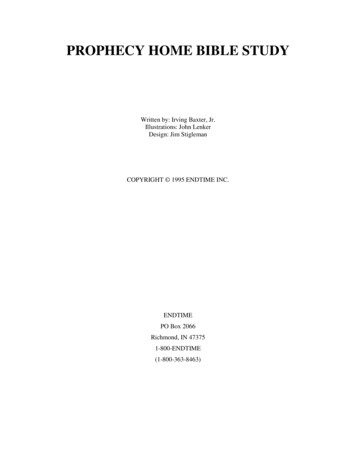
Transcription
Prophecy is like a lamp shining in a dark place. 2 Peter 1:19LamplighterL AMB & LIO N M IN ISTRIE Sa Non-Denominational Christian Media MinistryMAY/JUNE 2022all eyes onDry Bones Rising Will israel survive? Shauvot send me a jew
Lamplighter May-June 2022A bi-monthly publicationproduced byLamb & Lion MinistriesFounderDr. David R. ReaganExecutive EditorCEO Sr. EvangelistTim MooreAssociate EditorCreative DesignerJana OlivieriReceive the Lamplighter freeto your email inbox when yousign up for our e-newsletterat lamblion.comReceive the hard-copyversion of the Lamplighterto your mailbox:U.S.A. 25 - 6 issuesInternational 50, 6 issuesOrder at lamblion.comor call (972) 736-3567Mon-Fri, 8a-5p CTCheck or money orderpayable to:Lamb & Lion MinistriesPO Box 919McKinney, TX 750702 May/June 2022FROM THE EDITORTIM MOOREDirector & Sr. EvangelistLamb & Lion MinistriesWhere were you on November 22nd, 1963? September 11th, 2001?Those dates mark events that stand out in America’s consciousness—eventsso impactful that they are indelibly stamped on our collective memory.What about May 14th, 1948? Or June 7th, 1967? Those dates are tied to eventsthat occurred half a world away but reflect the resurrection of an ancient prophetic promise to the Jewish people. God promised that even as He disciplinedHis chosen people, He would protect and preserve them. He promised that Hewould regather them back from the four corners of the earth to the land He gavethem and that He would reestablish them as one nation on the mountains ofIsrael.All that happened within the past century.Does your heart resonate with praise for God that He has allowed us to witness prophecies coming to pass within our lifetimes? Jesus told His disciples,“Blessed are your eyes, because they see; and your ears, because they hear. Fortruly I say to you that many prophets and righteous men desired to see what yousee, and did not see it, and to hear what you hear, and did not hear it” (Matthew13:16-17).This edition of the Lamplighter will call your attention to what is arguably themost dramatic and exciting Sign of the Times pointing to Jesus’ soon return: theresurrected nation of Israel. As foreseen by Ezekiel, the dry bones made a greatrattling sound as they gathered back together beginning at the turn of the 20thcentury. As muscle and flesh was added to the skeletal frames, they finally stoodup and claimed their ancient homeland.In the decades since that pivotal moment, Israel has come under siege onmultiple occasions. Wars, terrorist attacks, and hate-fueled intifadas have comeand gone. Political pressure has waxed and waned. Allies and friends have beenfickle and unreliable. But the Zionist nation—built around God’s own MountZion—remains. It will continue to remain because God has promised that itwould.David Reagan has told the account of meeting a man who stated that hewished he could have lived in biblical times. To quote Dave’s emphatic response,“You do! You do live in biblical times! Open your eyes and see!!”The Israeli national anthem is titled Hatikva—The Hope. The little girl on thecover of this edition represents the hope God has kept alive in Jewish hearts andthe fulfillment of His ancient promises in the modern era.As you read the pages ahead, we hope your eyes are opened to all God hasbeen doing among the Jewish people. And we hope that your ears will perk up,ready to hear the shout that our Bridegroom is coming! Y
Hatikva “The Hope”(Jewish National anthem)As long as in the heart, within,The soul of a Jew still yearns,And onward, towards the ends ofthe east,An eye still gazes toward Zion;Our hope is not yet lost,The hope of two thousand years,To be a free nation in our land,The Land of Zion and Jerusalem.www.lamblion.com 3
israel in old testament prophecyDRY BONES RISINGTim mooreFor I will take you from the nations, gather you from all thelands, and bring you into your own land.Ezekiel 36:24Jesus is the focal point of the entireBible. The Old Testament prophetspointed to His humble first adventand saw glimpses of His glorioussecond coming. Second only to theMessiah, the prophets were alsofocused on Israel—the apple of God’s eye (Zechariah 2:8).Seventy-four years ago, the world witnessedthe rebirth of a nation thought to be long-dead.Overcoming 2000 years of Roman-imposed diaspora, the Jewish hope of regathering in their ownPromised Land came to fruition. This hope—uttered every Passover as the prayerful, “next year inJerusalem”—did not spring merely from the wishfulhearts of dispersed Jews. It echoed the propheticpromise of God repeated throughout the Old Testament.The dispersal of the Jews was so complete, theirpersecution and oppression so incessant, andtheir existence so resented by the Gentile world,that any prophecy for their regathering seemedtoo far-fetched to be taken literally. And so, spurredtoward anti-Semitism by misguided leaders andignoring the clear teaching of Scripture, even theChurch eliminated the Jewish people from its understanding of God’s plan for humanity. That is notto say that every Christian expressed anti-Semitism or embraced Replacement Theology, but theoverwhelming majority of the Church did so—to itsgreat discredit.But God’s promises are “Yes, and Amen.” (2 Corinthians 1:20). And so, His promise to Abraham andhis genetic descendants remains in effect to thisday. Not because the Jews are deserving of blessing; not because they were or are a mighty nation4 May/June 2022or a numerous people; not because they have merited God’s special providence. He made that pointabundantly clear in Ezekiel 37:22-28, right beforeHe led Ezekiel out to a valley full of dry bones.Can These Bones Live?I’ve long considered how I would have answered God’s question had He spoken to me, “Sonof man, can these bones live?” (Ezekiel 37:3). With2 engineering degrees and steeped in modern rational thought (let alone a smattering of biologicaland medical learning), I would have answered, “Noway! They’re dead, dried up, and disjointed.” ButEzekiel demonstrated far more wisdom in his recognition of God’s unlimited power. He responded,“O, Lord God, You know.”God did know. He knew that regardless of outward appearance and beyond human comprehension those dead bones would come to life basedon the utterance of a prophetic word. Just like thecenturion who recognized Jesus’ authority to sendword by another and have His commands obeyed,God’s authority could be pronounced through Ezekiel’s deliverance of that prophetic word. As Ezekiel spoke, those bones rattled and rolled together—rocking Ezekiel’s world. And that was just thepreview of a greater fulfilment to come!God explicitly said that the dry bones represented the whole house of Israel. He knew that a pointwould come when they would say, “Our bones aredried up and our hope has perished. We are completely cut off” (Ezekiel 37:11). But God promisedto open their graves, regather them as His belovedpeople, and restore them to the land of Israel.For almost 19 centuries, the thought of Jews returning to the God-forsaken Land of Israel seemedbeyond belief—to Gentile and Jew alike. And makeno mistake, the Land was forsaken. God’s curse lingered on the Land throughout the millennia of theJewish exile—as foretold in Ezekiel 33:28-29 and
described by witnesses like Mark Twain (in The Innocents Abroad). But a smallhandful of Christians clung to belief that God meant what He had said. And,in the recesses of their heart, Jews dared to hope, maybe, next year in Jerusalem. (* See the words of the Jewish national anthem, Hatikva, on page 3.)Hope Made TrueIn the late 1800s, God motivated Christian Zionists and Jewish dreamersto dare to aspire for the establishment of a Jewish nation in the Land of Israel. The idea did not inspire mass enthusiasm. Too many Christians remaineduncaring about the fate of the Jewish people and were generally hostile tothem, given the undercurrent of anti-Semitism flowing through the Church.Jews had acclimated to live in places like Germany and Poland and Russia, andsaw no need to uproot once again to stream back to a desolate wasteland on thewestern shore of the Mediterranean Sea. And, while not yet incited toward rabidhatred of Jews, the Muslim world was generally antagonistic toward the Jews.The events of the early 20th Century set thestage for Ezekiel’s prophecy to be fulfilled.Great Britain’s government expressedits intention to support the establishment of a Jewish State through theBalfour Declaration—largely becauseof official gratitude toward the Jewishscientist who was instrumental in theAllied victory in World War I. (Thatman, Chaim Weizmann, would laterbecome the first president of Israel.)And, upon actually winning the war,Great Britain was given mandatoryauthority over the area known at thetime as Palestine—the degradingname given to the Land of Israelby the Romans in the first centuryAD.While the wheels of geo-politics were turning, the Jewswere being motivated to leavetheir homes and make aliyah(a Hebrew word for immigration that means, “goingup”) to Israel. Simply put,those who survived theHolocaust in Europerealized that no degreeof assimilation couldguarantee their securitywww.lamblion.com 5
in Gentile nations. Many thousands of them determinedto go home to Eretz Yisrael—the Land of Israel.Following a political drama in the newly-formed United Nations, the Jews of Palestine were given international sanction to declare a state. So, on May 14th, 1948, themodern state of Israel was born. As soon as David BenGurion declared Israeli independence, five Arab armieslaunched an all-out attack, declaring their intention toannihilate the Jews. Miraculously, the fledgling Jewishstate repelled those numerically superior forces and established a ragged but defensible border.The dry bones had come out of their graves andstood up in their own land, Israel—just as God promisedin Ezekiel 37:11-13.Afflicted, But not CrushedThe next eight years brought almost constant terrorist activity. Israel repeatedly engaged in open conflictwith its neighbors, only to emerge victorious time andtime again. Embarrassed by an unending string of defeats, Arab leaders decided to antagonize as they awaited another opportunity to attack.By the 1960s, a populist general rose to power inEgypt. President Gamiel Nassar fanned the flames ofArab nationalism and declared himself the head of theUnited Arab Republic. He rallied restless Arabs throughout the Middle East with his impassioned hatred for the“Zionist entity” to his north. He boasted and blustereduntil he was able to secure military alliances with Lebanon, Syria, Iraq, Saudi Arabia, and Jordan—effectivelysurrounding Israel.A Renewed Threat to IsraelIn early 1967, Nassar repeatedly broadcast his intention to destroy Israel. Some historians claim that his vitriolic speeches were meant simply to arouse and inspirethe “Arab street.” Whether through intention or blundering, Nassar propelled his United Arab Republic towardwar. On May 16th, Nassar ordered the UN EmergencyForce (stationed in Sinai to ensure Arab-Israeli compliance with a UN-brokered 1956 cease-fire) to withdraw.In a cowardly act of diplomatic capitulation, UN Secretary General U Thant acquiesced to this demand immediately.On May 22nd, Nassar blockaded the Strait of Tiran—6 May/June 2022Egyptian Propaganda Cartoon from 1967Israel’s only access to the Red Sea and the conduit forall of its oil. The world has long recognized such an aggression as a “casus belli”—a justification for war—butWestern nations, including the United States, urgedIsrael to restrain itself. Making matters worse, Nassarmobilized his forces and staged them in the Sinai, substantiating his stated intention to march north throughthe heart of Israel.Israel responded by mobilizing its reserves—an action guaranteed to cripple its own economy within shortorder. Some in Israel’s notoriously divided governmentwanted to wait for Western relief from the mountingpressure, while others argued that the nation could beannihilated while the West dithered. With the survival ofIsrael and its millions of citizens at risk, Israeli leadersauthorized a daring plan to control the ensuing battle—Operation Moked (“Focus”).Modern-Day GideonsOn June 5th, waves ofIsraeli Air Force planeslaunched toward Egypt—leaving only 12 aircraft inreserve to defend the skiesover Eretz Israel. Followingcarefully crafted attack plansbased on painstaking intelligence, the Israelis caughtthe Egyptian Air Force bytotal surprise. Within a matter of hours, over 300 Egyptian aircraft were destroyed,versus only 19 Israeli planes.Facing a military disaster, Nassar goaded his Araballies into joining the fray. Syria, Jordan, and then Iraq
attacked Israel—leading to devastating counterblows bythe Israeli Air Force. In short order, the Israel victory inthe air turned into a rout on the ground.This landmark war lasted six days and is remarkablestill today for its brevity. It ended when the Arab nationsfinally admitted their humiliating defeat and begged theUnited Nations to impose a ceasefire. Although knownas the Six-Day War, an Indian Air Force eyewitness latertestified, “The war was actually won by Israel in the firstfour hours of Monday, June 5th, 1967.”“The Old City of Jerusalemis in Our Hands”From a prophetic perspective, the Six-Day War wassignificant. That war demonstrated the power of Zechariah’s prophetic word:In that day I will make the clans of Judah like afirepot among pieces of wood and a flaming torchamong sheaves, so they will consume on the righthand and on the left all the surrounding peoples,while the inhabitants of Jerusalem again dwell ontheir own sites in Jerusalem.Zechariah 12:6No military analyst would have anticipated the incredible victory the Jewish nation achieved over itsnumerically superior foes. But God had promised thatonce regathered to the Land of Israel, the Jewish peoplewould never again be uprooted.The other significant prophetic event occurred in thefinal hours of the war. With a ceasefire looming, Israel’s political and military leaders authorized IDF paratroopers to rush into Old Jerusalem and reclaim Israel’sancient capital from the Jordanian occupiers. DefenseMinister Moshe Dayan expressed the miraculous fulfillment of Jewish hopes and dreams when he announced,“The Old City of Jerusalem is in our hands.” IDF ChiefRabbi Shlomo Goren also understood the propheticsignificance of the moment. He rushed to join his paratroopers at the Western Wall, blew a shofar, and said,“I proclaim to you the beginning of the Messianic Age.”Demonstration of God’sFaithfulness to His PromisesSince 1948, Israel has had to fight massed conventional armies, waves of Palestinian terrorists, international scorn and condemnation, and Satanic movements like “Boycott, Divest, and Sanction” (ever popularon American college campuses). Israel’s ongoing victories against its hate-inspired foes demonstrate God’sfaithfulness to His promises. As recorded in Amos 9:15:“I will also plant them on their land, and they willnot again be rooted out of their land which I havegiven them,” says the LORD your God.Students of Bible prophecy know God promised thatIsrael would return to its ancient homeland, reestablishitself as a nation, and never again be removed. We alsoknow that when Jews once again occupy Jerusalem, theKing of kings is poised to return at any moment.The air campaign that launched the Six-Day War fifty-five years ago was called “Operation Moked” (Focus).As Christians, our focus is ever and always on JesusChrist. With Bible prophecy in mind, Peter also encourages us:Therefore, with minds that are alert and fully sober, set your hope on the grace to be brought toyou when Jesus Christ is revealed at His coming.1 Peter 1:13Just like Operation Moked caught the Egypt Air Forceunprepared 50 years ago, Jesus’ arrival will come as atotal surprise to those who are unaware, unprepared,and unalert. Make sure that you are ready when thetrumpet sounds! YIsraeli Paratroopers atthe Western WallShlomo Goren atthe Western Wallwww.lamblion.com 7
israel in new testament prophecyThe Withered FigTim mooreI found Israel like grapes in the wilderness;I saw your forefathers as the earliest fruiton the fig tree in its first season.THosea 9:10he regathering of the Jewish people to theLand of Israel is prophesied repeatedly inthe Old Testament. In the New Testament,Jesus offered another clue to the timingof the end of the age when He mysteriously cursed ahapless tree. What was the Lord communicating—to Hissurprised disciples and to us—by His seemingly uncharacteristic action?A Nation Cursedand Cast AsideWhen Jesus walked throughout the Promised Land2000 years ago, Israel was already past its prime. Thegolden era under David and Solomon had come andgone. Divided into Israel and Judah, the Jews had beenconquered by the Assyrians and Babylonians and carted off into exile. Fulfilling the prophecy of Isaiah, Cyrushad encouraged Jews to return to Jerusalem and rebuildthe temple. Waves of exiles returned from the east, repopulating the Land—even as Samaritans and othersnow shared the territory once known as Israel.Then came Alexander and his generals, followed byRome and its legions. To the Caesars, the Jews of Judeawere a bothersome population in a backwater territory who were frustratingly insistent on maintaining theirown religion. Convictional Jews longed for the Messiah. Zealous Jews sought a military leader to throw offRome’s yoke. None of them were expecting the Anointed One to lay down His life on a cross.While He ministered, Jesus consistently challengedthe expectations of His disciples and His followers. Heshowed them that God is not pleased by sanctimoniousreligiosity, but with repentance and obedience. ThroughHis death, He offered the innocent blood needed to ensure that God’s wrath would pass over anyone who puttheir faith in Him.8 May/June 2022Jesus’ message was clearly for the Jews first, even asHe demonstrated a willingness to bless Gentiles as well.However, His love for individual Jews was matched byimpatience with the Jews as a collective whole. That iswhy He offered His disciples a dramatic object lessonby cursing a hapless fig tree on His way to cleanse thetemple of money-changers.Seeing a lone fig tree by the road, He came to it andfound nothing on it except leaves only; and He said to it,“No longer shall there ever be any fruit from you” (Matthew 21:19).That fig tree, found barren of figs even though it wasnot the season for figs, withered dramatically at Jesus’command.Cast Aside, Butnot ForsakenWe are sometimes convinced that Jesus was meekand mild to the point of being a wimp. Nothing couldbe further from the truth. Jesus balanced unfathomablepower with absolute control. He did not lash out in rashanger or wring His hands in the face of evil. With a wordHe stilled a storm, healed broken bodies, and restoredlife. He described the judgment that would fall upon Jerusalem and the Jews in general, because most of themrefused to accept Him in their time of visitation. Symbolized by a fig tree, the nation that bore little fruit woulditself be cursed to wither for a season.Approximately 40 years after Jesus’ death, resurrection, and ascension into heaven, Rome’s 10th Legion put
Tree is Blooming!down a Jewish insurrection with an iron boot, destroying the temple inthe process. Those Jews who were not slaughtered in Judea were drivenout of the Land.For the next 1800 years, Jews became known as outcasts and vagabonds. They were persecuted and ostracized. They were forcibly converted and then accused of heresy. Inquisitions, pogroms, and edictskept them down and out in most of the places they dared to try to live.Lacking much fruit in the season of His first Advent, the Jewish nationwas cut off and cast aside for almost 2 millennia. The lesson of Luke 13:69 was applied to God’s own chosen people.But that is not the end of the story.Tel Aviv in 1909Tel Aviv TodayDuring the long centuries of the Diaspora—the Jewish dispersalamong the nations—as the Jews were afflicted and oppressed, the Landbecame barren. Although in the fullness of time, God prepared both thepeople and the Land to realize the prophetic promises.In the late 1800s, a few impassioned Zionists were advocating for aJewish state. However, most Jews believed they were accepted by thesocieties in which they lived. The Jewish emphasis on academic studyand financial prowess made them excellent students, musicians, businessmen, artists, doctors, scientists, and citizens. In spite of lurking antisemitism and episodic persecution, most Jews were content to pursuequiet lives in places like Germany, Poland, France, and Russia. All thatwould change in the 20th Century.Preparing the Land for the PeopleLest we get ahead of our story, it is important to realize that just asfertile soil is required for a healthy fig tree, the Land had to be preparedfor the people before the Diaspora could return.Over the centuries following Rome’s expulsion of the Jews in 70 AD,the Promised Land fell under a curse. Known as Palestine (the Lati-“Now learn theparable from the figtree: as soon as itsbranch has becometender and sproutsits leaves, you knowthat summer is near;so you too, when yousee all these things,recognize that Heis near, right at thedoor.Matthew 24:32-33www.lamblion.com 9
nized version of the name given to the Holy Land by theRomans), it was controlled by a succession of foreignpowers—including Christian crusaders and Islamic caliphates. By the 15th century, the Ottoman Empire obliterated the 1000-year Christian Byzantine Empire andbegan to rule Palestine with a heavy hand.God’s curse lingered on the Land throughout the millennia of the Jewish exile—as foretold in Ezekiel 33:28-29.And make no mistake, the Land was forsaken—denudedof vegetation, deprived of people, and largely devoid oflife. In 1869, Mark Twain documented the cursed statusof the Holy Land in his book, The Innocents Abroad. Herightfully understood that God’s hand of judgment hadfallen on His own Promised Land.things (the destruction of the temple) happen, and whatwill be the sign of Your coming, and of the end of theage?” (Matthew 24:3).We have extensively addressed the discourse thatfollows in Matthew 24. But the lesson of the fig tree offers a key to understanding the timing of the end. Jesussaid, “Now learn the parable from the fig tree: when itsbranch has already become tender and puts forth itsleaves, you know that summer is near; so, you too, whenyou see all these things, recognize that He is near, rightat the door” (Matthew 24:32-33).But when Europe was consumed by war early in the20th Century, the “sick man” Ottoman Empire sided withGermany. It chose poorly. In the aftermath of the war, thevictorious allies divided the Ottoman territory amongthemselves. Thus, France came to oversee Lebanonand Syria, and the British acquired a mandate to governPalestine and Trans-Jordan. For the first time in almost2 millennia, the Jewish Seder prayer, “Next year in Jerusalem,” seemed like more than a throw-away sentiment.Once the land was wrested from its Ottoman occupiers and a commitment had been given to supportJewish aspirations, reestablishment of Israel would haveseemed to be a fait accompli. But Jewish motivation wasnot yet sufficient to emigrate to a Middle East wasteland.The horror of the Nazi Holocaust changed Jewishhearts and minds. Jews realized that away from theirPromised Land they would always be homeless. So, bythe thousands (and eventually millions) they streamedback to Eretz Israel—the Land of Israel.The fig tree branch was becoming tender and beginning to put out leaves.Now Learn This Lessonfrom the Fig TreeIn the week between the triumphal entry of Palm Sunday and His crucifixion, Jesus spoke much about Israel’srejection (Matthew 21:28-44), the shift of the Gospel tothe Gentiles (Matthew 22:1-14), and the judgment aboutto fall on Israel (Matthew 23:13-39). He also respondedwhen the disciples asked Him, “Tell us, when will these10 May/June 2022There are many signs contained in the proceeding 27verses. But Jesus specifically pointed His disciples backto the dramatic lesson of the fig tree from earlier in thesame week. The fig tree that was cursed for failing tobear fruit for the Messiah would be restored. And, alongwith all the other signs of the times, that crucial sign tellsthose with eyes to see that He is near.Evidence RightBefore Your EyesAsk the average Christian to describe a present-dayfulfillment of Bible prophecy and they’ll probably lookat you funny. The idea that God is actively bringing Hisancient promises to pass before our very eyes is something they probably haven’t considered.But over the past 100 years, the amazement of Habakkuk 1:5 is once again appropriate: “Look among thenations! Observe! Be astonished! Wonder! Because Iam doing something in your days—you would not believe if you were told.”That was the way the Lord described His plan to raise
up the Chaldeans to sweep across the Jewish nation.Habakkuk was appalled at the horror of such a judgment and registered his complaint before the Lord. Godreiterated the finality of His declaration, saying, “For thevision is yet for the appointed time; it hastens toward thegoal and it will not fail. Though it tarries, wait for it; forit will certainly come, it will not delay” (Habakkuk 2:3).In the case of the most important prophetic sign of all,the evidence is right before our eyes. The withered treethat did not bear fruit when Jesus was here 2000 yearsago has become tender and put forth new branches. Weknow that He is coming soon.I Know the PlansI Have for YouThroughout the Old Testament, God offered glimpsesof His plans—His Gospel plan, His plan to discipline yetprotect and preserve Israel, and His plan to bring all ofhuman history to a close. Scoffers have dismissed therelevance of His plans for ages because God has tarried.But those of us who put our faith in Christ are given understanding when we “read and heed” (in the languageof Revelation 1:3 and 22:7) His prophetic Word.In his beautiful song, “It is Well With My Soul,” HoratioSpafford wrote, “And Lord, haste the day when my faithshall be sight ” Some of the glorious promises of Bibleprophecy still await fulfillment. Others are being fulfilledbefore our very eyes. We can bear witness to God’sfaithfulness by pointing to the promises He is keepingright now. That is also why we take pilgrims to Israel: tobear witness to what God is doing in our own day andage.miss an opportunity to say so. In the words of Psalm107:43, “Who is wise? Let him give heed to these things,and consider the lovingkindnesses of the LORD.”In conclusion, all of the great prophetic promises fulfilled just recently in the land of Israel prove that we areliving on borrowed time! YNOTABLE QUOTESThe Jews areGod's chosenpeople.wecannot placeourselves inopposition toIsrael withoutdetriment toourselves.YRev. BillyGrahamLet the Redeemedof the Lord Say SoTake a moment and read Psalm 107.In light of the Diaspora (the scattering of the Jews) foralmost 2000 years, see if that Psalm does not describethe Jewish regathering “from the east and from the west,from the north and from the south” (v. 3). One day Jewisheyes will be opened en masse to see the Messiah. Untilthen, you and I have a great privilege. We are among theredeemed mentioned in verse 2. We know already thatthe LORD is good; that His lovingkindness is everlasting.If you are among the redeemed of the Lord, don’twww.lamblion.com 11
DR. DAVID R. REAGANWill IsraelSurvive?The answer to my title question from the viewpoint of world politics is an emphatic “No!”And the reasons are painfully obvious: Israel is a tiny country the size of New Jersey with aJewish population of only 7 million. It is surroundedby 22 Arab countries with a population in excess of350 million, nearly all of whom are dedicated to theannihilation of Israel. The Arab military forces adjacent to Israel now haveso phis ticated missiles, which they are willing to useindis criminately. Iran (a non-Arab neighbor) has missiles capable ofreaching Israel and is developing nuclear capacity.Its leaders have announced repeatedly that as soonas they produce a nuclear bomb, they will use it toannihilate Israel. The world’s major international organizations (theUnited Nations, the European Union, and the Vatican) are all com mitted to forcing Israel to surrenderher heartland to the Arabs, leaving the country only19 miles wide at its narrow est point. The same organizations are demanding that Israelsurrender all or half of her capital city of Jerusalem. The world’s two superpowers, the United States andRussia, have joined the rest of the world in demand12 May/June 2022ing the creation of a Palestinian state in the heartland of Israel, a state that would become a terroristlaunching pad for the take-over of all of Israel. The people of Israel have grown war-weary after 74years of never-ending hostilities. Many of the current leaders of Israel have growncorrupt and have lost the Zionist vision. And some ofthe most corrupt are religious leaders who will selltheir souls for a shekel. The secularization of Israeli society has produced aloss of faith in God and in the truths of their religion,which, in turn, has generated an attitude of defeatism. Both the people of Israel and their leaders have embraced a policy of appeasement that only whets theappetite of the Arabs and encourages them to pressharder for more and more Israeli capitulations. And so, understandably, from the world’s viewpoint,the annihilation of Israel is only a matter of time.
In the Bible we read ofempire after empirecoming against Israel—yet where are theseempires today?They are all in thedustbin of history;whereas the Jews areback in theirhomeland with theirown nation-state.God’s ProtectionBut there is a supernatural Power of Protection atwork here that the world does not rec
that any prophecy for their regathering seemed too far-fetched to be taken literally. And so, spurred toward anti-Semitism by misguided leaders and ignoring the clear teaching of Scripture, even the Church eliminated the Jewish people from its un-derstanding of God's plan for humanity. That is not to say that every Christian expressed anti-Semi-


